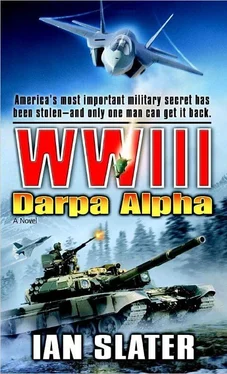As the Super Stallion hit a series of sharp wind shears, she felt a wave of nausea pass through her, something she had not felt since experiencing what her DI had introduced as a “visit to the pool,” a gross understatement, if Melissa had ever heard one, of the terrifying requirement of each marine to float in full battle dress and boots in the dreaded water-training facility.
Even now, the memory of impending drowning and the palpable dread one experienced on approaching the hated drop boards over the water which she, like any other recruit, had to master, still haunted her dreams, and now, as the Stallion continued to buck, she prayed to God, as she had prayed with the Yorktown ’s padre, that she would not find herself in deep water in combat.
As they approached the gray, socked-in coastline of Russia’s wild and lonely far eastern coast, turbulence struck the Super Stallions.
“Need a bag?” Sal asked Choir.
“How ’bout a bucket?” proffered Aussie.
Choir’s expression segued from mild anxiety into a broad smile. “I’m feeling great.”
The Stallion dropped again, the G-force lifting many of the marines off the web-seats to clearly voiced expressions of disapproval from the men and Melissa who, on this helo alone, formed a third of the MEU’s Bravo rifle company which, in turn, constituted one of the three rifle companies of what would be the MEU’s battalion landing team.
Freeman saw the alarm on Melissa’s face, but it vanished as quickly as it had appeared, marine discipline arresting any potential show of alarm. For her to have complained or even sworn would have immediately been seen as a typical “skirt” reaction. The parent in Freeman wanted to reassure her that the turbulence would probably subside as soon as they passed over the coastal mountains between Glazkovka and Cape Titova on the air route that he and Tibbet had selected through the valleys between the Kiyevka and Ussuri rivers. But the officer in him told him not to single her out; it would only reinforce her marginalization, which he’d sensed, albeit subtly, during liftoff from Yorktown . Still—
“Well,” announced the Stallion’s crew chief, “we’re well past Cape Titova!” Hoots and laughter followed.
“Bring it on!” yelled someone.
Freeman saw Melissa Thomas smile, trying to be one of the boys, and he empathized with her sense of being an outsider — everyone had such moments — and thought about how he might help her to feel included in the team. He asked a marine in the mortar squad, a loader, about Thomas’s classification.
“She’s an E-2, S/S, sir.”
“Ah,” said Freeman, the designation telling him she was a private first class with sniping credentials. Impressive.
“Yes, sir,” continued the loader. “She’s a good shot.”
A “good shot” was an understatement. S/S told the general that this marine with the shy, dark eyes had been tough enough to have graduated from Parris with not only a high score in marksmanship but also the designation “Scout/Sniper.” It was an outstanding achievement, but for a woman in a man’s world, it was yet another way of moving herself, albeit unwittingly, further from her fellow marines. The rifle with the big scope told Freeman that Melissa must have been able to repeatedly hit a man-sized target in the head at ranges greater than half a mile. You didn’t have to be a giant to do that occasionally, but to do it consistently meant you had to be strong and have iron nerves. “Nerves of iron,” Freeman used to tell his recruits, “not nerves of steel, because steel springs back at you. No, you need iron will to lie there for hours in your hide, not moving so much as a hair. Waiting, controlling your bladder sphincter through sheer will. You might have the luxury of a scope spotter to share the mission with you, or you might be alone.” It was Douglas Freeman’s intention, as had always been his inclination, to make the outsider feel at home.
A collective groan greeted another sudden gut-plummeting drop in an air pocket, Aussie catching a glimpse out of one of the Super Stallion’s starboard windows of a white squiggle of river which he guessed must be the Kiyevka, and farther west, ragged fragments of mountain mist above woods that in parts obliterated the sliver of another river cutting through forests as thick and dark as anything he’d seen on the other side of the world at Priest Lake.
The general too had seen the black forests and detected a heightened tone of urgency rushing back from the Stallion’s cockpit into the forty or so pack-laden marines of Bravo rifle company. For a millisecond Eddie Mervyn and interpreter Johnny Lee saw what looked like a marine Harrier diving through the gray stratus, and detected an acrid smell invading the cabin.
“Hold tight!” yelled the crew chief. “Evasive action.”
“Another fucking fisherman?” said Aussie.
“More than one,” said the crew chief unsmilingly.
The Stallion was bucking and yawing violently amid a black, pock-scarred sky, the pilot battling the yoke, fighting to evade the AA fire.
“Oh, shit!” said a marine, one of the few who had a clear view through one of the square windows over the helo’s stubby portside wing. A loud ripping noise cut through the vibrating roar of the Stallion’s three engines and the deep thumping of its rotors as the helo’s gunners opened up, hot shell casings momentarily glinting golden in a sudden sunbeam that quickly disappeared into the stratus. The Stallion was on instrument flying, the copilot thanking God for the upgrade that had finally given the CH-53Es the forward-looking infrared and radar.
“Eight o’clock! Eight o’clock! AA!” The ramp’s right-side rear gunner was shouting to alert his ramp and crew-door colleagues. Aussie was able to glimpse only part of the helo’s two arcs of red tracer that were streaming earthward as they sought to silence the two anti-aircraft batteries manned by gunners who from this height looked no bigger than toys.
“More at six!” bellowed Eddie Mervyn.
“I see ’em!” acknowledged the crew-door gunner. This was followed by long, concerted bursts from the Stallion’s gunners, the interior of the “fuse,” the Stallion’s long troop cabin, filling with cough-inducing cordite fumes together with the smell of perspiring bodies, the heat having been turned way up to counteract the freezing rush of the slipstream through the open ramp and front crew door. Aussie saw Freeman talking animatedly on the radio phone and then caught sight of the Harrier, its 25 mm GAU cannon obliquely spitting devastating white fire into both AA batteries, knocking them out.
Several marines were being sick without time to grab the thick, brown paper “lunch bags” issued earlier by the crew chief. Over the noise of machine-gun fire, the rotors’ whoomp whoomp, and engines roaring, there was now a series of almost inaudible, soft, popping noises as the Stallion released its flares in hopes of drawing any anti-aircraft missiles to them rather than to the helo. Upon entering Russian airspace, everyone with the Bird Rescue armada had been worrying about SAMs, the big Russian surface-to-air missiles that had taken such a heavy toll of the B-52s and other American aircraft in ’Nam. Freeman, however, with the Priest Lake catastrophe fresh in mind, was more worried about the smaller, deadly Igla and other shoulder-fired MANPADs at this relatively low altitude. Iglas had a range of more than two miles. He was praying that the AA gunfire was all the flak that would come the helos’ way. The general checked the Super Stallion’s airspeed indicator: 167 m.p.h. With the Stallion’s engines on maximum power, they should be over the site soon, unless more AA batteries were waiting in ambush down the valley.
Читать дальше












